China’s legal reforms won’t work without structural changes in its criminal justice system
 On 24 October 2016, the Chinese Communist Party (CCP) began the sixth plenum, an annual meeting of senior members of the CCP that shapes policy. The last three plenums since Xi Jinping became president have produced some human rights reforms that fail to address the structural problems in the People’s Republic of China (PRC). In practice, these reforms have done little to protect human rights or the rule of law. Two weeks before this year’s plenum, an opinion on reforming criminal procedure was released. Similar to reforms from previous plenums, the opinion will not produce real reforms to protect or respect human rights.
On 24 October 2016, the Chinese Communist Party (CCP) began the sixth plenum, an annual meeting of senior members of the CCP that shapes policy. The last three plenums since Xi Jinping became president have produced some human rights reforms that fail to address the structural problems in the People’s Republic of China (PRC). In practice, these reforms have done little to protect human rights or the rule of law. Two weeks before this year’s plenum, an opinion on reforming criminal procedure was released. Similar to reforms from previous plenums, the opinion will not produce real reforms to protect or respect human rights.
The third plenum abolished re-education through labour, a heavily criticized form of extra-judicial punishment. However, other forms of extra-judicial detention were not impacted and in some cases re-education through labour facilities continued to operate after being renamed. The fourth plenum promised to improve rule of law. Nine months later, about 250 human rights lawyers, legal assistants, and activists were detained in one of the largest crackdowns since 1989.
On 10 October, the Supreme People’s Court, Supreme People’s Procuratorate, and Ministry of Public Security released an opinion on reforming the criminal procedure law. In 21 clauses, the Opinion (English translation by China Law Translate) focuses on establishing basic rules for convictions, evidence, transparency, and courtroom behavior. Like previous reforms, the Opinion will not impose any meaningful reform because it does not address the fundamental structural problems in the PRC’s criminal justice system.
Clause 17 of the Opinion gives defendants the right to obtain defence counsel, but clauses 18 and 19 threaten criminal punishment for defenders, litigation participants, and others. Taking into account the ongoing crackdown on civil society, this threat cannot be ignored. The clauses require criminal punishment for, among other things, disrupting litigation and not following the judges’ instructions. However, without an independent and professional judiciary the clauses increase the threat to human rights advocates. In May 2015, when defence attorneys complained that their client was illegally in shackles the judge responded by saying “who cares if it’s illegal.” Rather than protect the rule of law, the Opinion threatens these lawyers with criminal punishments.
The Opinion takes some steps to prevent the use of torture. Clauses 4 and 5 prohibit the use of testimony and confessions obtained through torture and require the recording of interrogations. Even if implemented these reforms will not prevent torture. The Opinion does not prohibit enforced disappearances, which violate international law but are permitted by the Criminal Procedure Law. Torture is most common during enforced disappearances. Two months ago, two Tibetan monks were taken by security forces. Their families do not know where they were taken or why. Victims of torture must show they were tortured and the penalty for torture is still the exclusion of evidence rather than criminal punishment for government officials.
The Opinion may even impose obstacles to excluding confessions by torture. Clause 13 requires that when there is a confession, the in-court debate “be primarily centred around sentencing.” At worst, this requirement could prevent people who confess under torture from bringing it up in court. At best, Clause 13 reinforces the emphasis on confessions rather than other forms of evidence. This incentivises police and prosecutors to extract confessions.
If the PRC is going to implement meaningful reform to fulfil its promises and international obligations, it must address structural problems. Merely announcing minor reforms that are rarely enforced cannot succeed.


